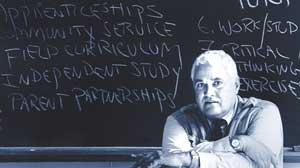When New York State Teacher of the Year, John Taylor Gatto, published his essay The Six-Lesson Schoolteacher in 1991, something seemed to resonate within the minds of people across the nation. Perhaps they remembered only too well the intense boredom, frustration, and enforced conformity of their own public school years. Perhaps the truth in the essay is simply too evident to be dismissed or denied. Now, in 2018, over two million American children are being homeschooled. Millions of others have been removed from the public school system and enrolled in some sort of alternative education, including Montessori. Clearly, many parents have taken up Gatto’s challenge to look beyond the ‘norm’ of public schooling out of love and respect for their children.
Who is John Taylor Gatto and what does he believe?
 John Taylor Gatto (see picture) spent 26 years teaching in a variety of public schools in New York. In 1991, after winning the New York State Teacher of the Year Award, Gatto left his job, stating that he was “no longer willing to hurt children.” Disheartened and concerned by the very fundamentals upon which the system of public education is based, Gatto went on to become a celebrated public speaker and author. His books include A Different Kind of Teacher, The Exhausted School, Dumbing Us Down, and The Underground History of American Education.
John Taylor Gatto (see picture) spent 26 years teaching in a variety of public schools in New York. In 1991, after winning the New York State Teacher of the Year Award, Gatto left his job, stating that he was “no longer willing to hurt children.” Disheartened and concerned by the very fundamentals upon which the system of public education is based, Gatto went on to become a celebrated public speaker and author. His books include A Different Kind of Teacher, The Exhausted School, Dumbing Us Down, and The Underground History of American Education.
Gatto’s basic premise, outlined in The Six-Lesson Schoolteacher, is that the American public school system is largely responsible for a national humanitarian crisis. As Gatto points out, this system:
- Teaches children that their worth is determined by other people
- Causes children to be dependent on teachers/experts rather than on themselves
- Praises total conformity and condemns individuality as a threat to the system
- Teaches that schedule, not interesting work, is what has value
- Teaches that value is only possible under conditions of competition
- Leaves children with almost no private time
Gatto asserts that the public school system is expertly designed to produce dependent human beings who cannot think for themselves or take care of themselves. He proposes that the cruelty, materialism, and aimlessness one sees in a major portion of the U.S. population are the result of the combination of absent parents, television, and the institutionalization of public education.
Mr. Gatto urges parents to cut ties with the belief that going to public school enables mastery of a curriculum. Rather, he says that the public school experience enables mastery of mindless obedience to authority figures, and lifelong habits of dependency. This system is unlikely to produce brilliant, unconventional thinkers such as Benjamin Franklin or Abraham Lincoln – who were themselves almost completely the product of self-education.
How Dr. Montessori and John Taylor Gatto see eye to eye
One of Gatto’s chief indictments of the public school system is that it forces children to believe they must wait for the instruction of the teacher in order for learning to take place. Good kids do what Teacher says; only bad kids don’t conform. The Montessori classroom or homeschool presents a startlingly different atmosphere in which each child works independently, at his own pace, teaching himself. The child learns to be a learner. Maria Montessori advocated respect for the mind of the child, within the prepared environment, as the way to stimulate curiosity, inquisitiveness, and life-long learning.
I wish that time travel would make it possible for Maria Montessori and John Taylor Gatto to sit down together in conversation. I can almost imagine how passionately they would agree with one another about the fact that the purpose of education is to produce a self-sufficient adult, not an eternally dependent consumer. Both educators would eschew homework as an invasion of the child’s limited time for privacy and home life. Both educators would agree that non-violent conflict resolution is an essential life skill. Both would agree that concern for the community and the world must be learned at an early age if we are ever to experience world peace.
Compare the following quotations (emphases mine):
John Taylor Gatto:
“Wherever I go in the United States these days I hear of something called the crisis of discipline, how children are not motivated, how they resist learning. That is nonsense, of course. Children resist teaching, as they should, but nobody resists learning.”
Maria Montessori:
“And so we discovered that education is not something which the teacher does, but that it is a natural process which develops spontaneously in the human being.”
We Montessorians wonder, sometimes, whether or not the Montessori method is truly valid. How refreshing to receive validation that we are on the right track – from someone with years of experience in traditional education, no less. Clearly, choosing Montessori is more than just embracing hands-on materials or mixed-age classrooms. It’s a choice for the development of children as intelligent, capable, self-aware human beings and not automatons who depend on teachers, textbooks, and rules to govern their decisions.
For more information:
John Taylor Gatto’s website
Books by John Taylor Gatto at Amazon

